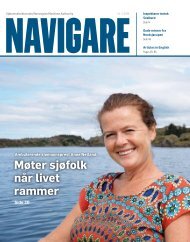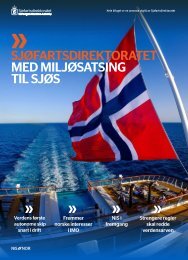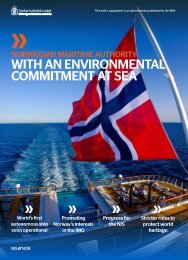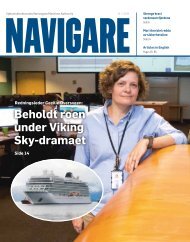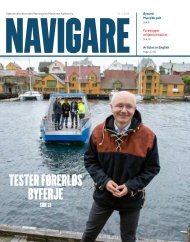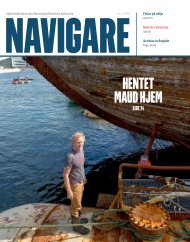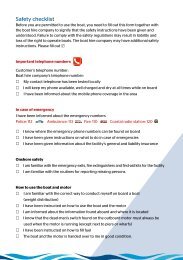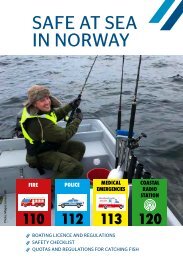You also want an ePaper? Increase the reach of your titles
YUMPU automatically turns print PDFs into web optimized ePapers that Google loves.
news<br />
New regulations for recycling of ships and<br />
moveable installations:<br />
Stepping up the fight<br />
against illegal shipbreaking<br />
A great majority of the large commercial European merchant vessels are<br />
scrapped outside of Europe, frequently under deplorable conditions for<br />
workers and the environment. New regulations that came into force on<br />
1 January this year are intended to ensure that Norwegian vessels are<br />
recycled in an appropriate and environmentally friendly manner.<br />
Werner A. Dagsland, Dept. of Regulations and International Agreements, NMA<br />
It has been well documented that parts of the<br />
Asian shipbreaking industry are fraught with<br />
unacceptable risks to life, health and the<br />
environment. In a country such as Bangladesh,<br />
which according to the Shipbreaking Platform<br />
NGO and Supreme Court Justice Rizwana<br />
Hasan is able to handle no more than 40 per<br />
cent of its own waste, decommissioned<br />
European vessels bring with them numerous<br />
work-related injuries and deaths. In addition,<br />
the practice of recycling ships directly on the<br />
beaches causes a negative environmental<br />
impact.<br />
‘The impression is created that ship<br />
recycling is a vital industry for Bangladesh,’<br />
Hasan told representatives of member states<br />
and the shipping industry in the EEA at a<br />
meeting in Brussels in February this year. ‘And<br />
18 000 jobs also sound like a lot. But a large<br />
proportion of these jobs are seasonal, and in a<br />
country with 180 million inhabitants this is<br />
really not a major industry.’<br />
Many believe that under the prevailing<br />
circumstances, handling the Western world’s<br />
waste costs more than it’s worth. In recent<br />
years, approximately 20 registered deaths<br />
annually have been linked to ship recycling in<br />
Bangladesh.<br />
HOPING FOR GLOBAL CHANGE<br />
Most of us would agree that raising the safety<br />
standards in shipbreaking yards worldwide is a<br />
crucial issue. Considering that the Hong Kong<br />
Convention unfortunately has attracted<br />
insufficient support to enter into force, we can<br />
only hope that the EU directive on recycling<br />
facilities that receive vessels under an EEA flag<br />
both within and outside of Europe will have<br />
ripple effects and bring about improvements<br />
globally.<br />
The new regulations apply to Norwegian<br />
vessels that have a gross tonnage of 500 or<br />
more and are not exclusively engaged in<br />
domestic traffic. A ‘vessel’ is widely defined<br />
and includes fishing vessels, floating and<br />
jack-up oil rigs and submarine vessels. After<br />
31 December this year, new vessels are<br />
required to have on board a valid certificate<br />
for their list of hazardous materials (an IHM<br />
certificate). From 31 December 2020, sailpowered<br />
vessels will also need to have a valid<br />
IHM certificate.<br />
LISTING OF APPROVED SHIP<br />
RECYCLING FACILITIES<br />
For Norwegian vessels encompassed by these<br />
regulations, this means that vessels that will be<br />
finally decommissioned after 31 December this<br />
year can only be recycled in facilities listed in<br />
the so-called EU list of approved ship<br />
recycling facilities. Prior to such recycling, the<br />
ship owner must:<br />
Prepare the vessel for recycling by signing<br />
an agreement with an approved facility<br />
Request and implement a final inspection<br />
Have a recycling certificate issued<br />
From December 2020, vessels other than EEA<br />
vessels that call on ports in the EEA must<br />
carry on board a declaration of compliance<br />
issued by the flag state. The declaration of<br />
compliance must document that the vessel<br />
carries an updated inventory of hazardous<br />
materials on board, and that this inventory has<br />
been prepared in accordance with the material<br />
requirements in the ship recycling directive.<br />
This monitoring of vessels with flags from<br />
outside the EEA will be essential to ensure<br />
competitive conditions for Norwegian vessels<br />
that are as equal as possible to those under<br />
another flag.<br />
THE WASTE DIRECTIVE<br />
For vessels that are not encompassed by these<br />
64 | <strong>Navigare</strong> 1 - 2<strong>01</strong>9










